Cardinal
Accelerating Discovery in Fusion and Fission Energy

Flexible Multiphysics
Geometry-agnostic multiphysics with (i) Computational Fluid Dynamics (CFD) and (ii) Monte Carlo radiation transport on CSG and CAD geometry
In-Memory Coupling
In-memory coupling and distributed parallel meshes to deliver high-resolution multiphysics at scale and on heterogeneous CPU-GPU systems
Powerful Postprocessing
Leverages MOOSE postprocessing systems for improved data analysis and to provide multiscale closures to other MOOSE applications
Cardinal is a wrapping of the GPU-oriented spectral element Computational Fluid Dynamics (CFD) code NekRS and the Monte Carlo particle transport code OpenMC within the MOOSE framework. Cardinal provides high-resolution thermal-hydraulics and/or radiation transport feedback to MOOSE multiphysics simulations. Multiphysics feedback is implemented in a geometry-agnostic manner which eliminates the need for rigid one-to-one mappings. A generic data transfer implementation also allows NekRS and OpenMC to couple to any MOOSE application, enabling a broad set of multiphysics capabilities. Simulations can also leverage combinations of MPI, OpenMP, and GPU resources.
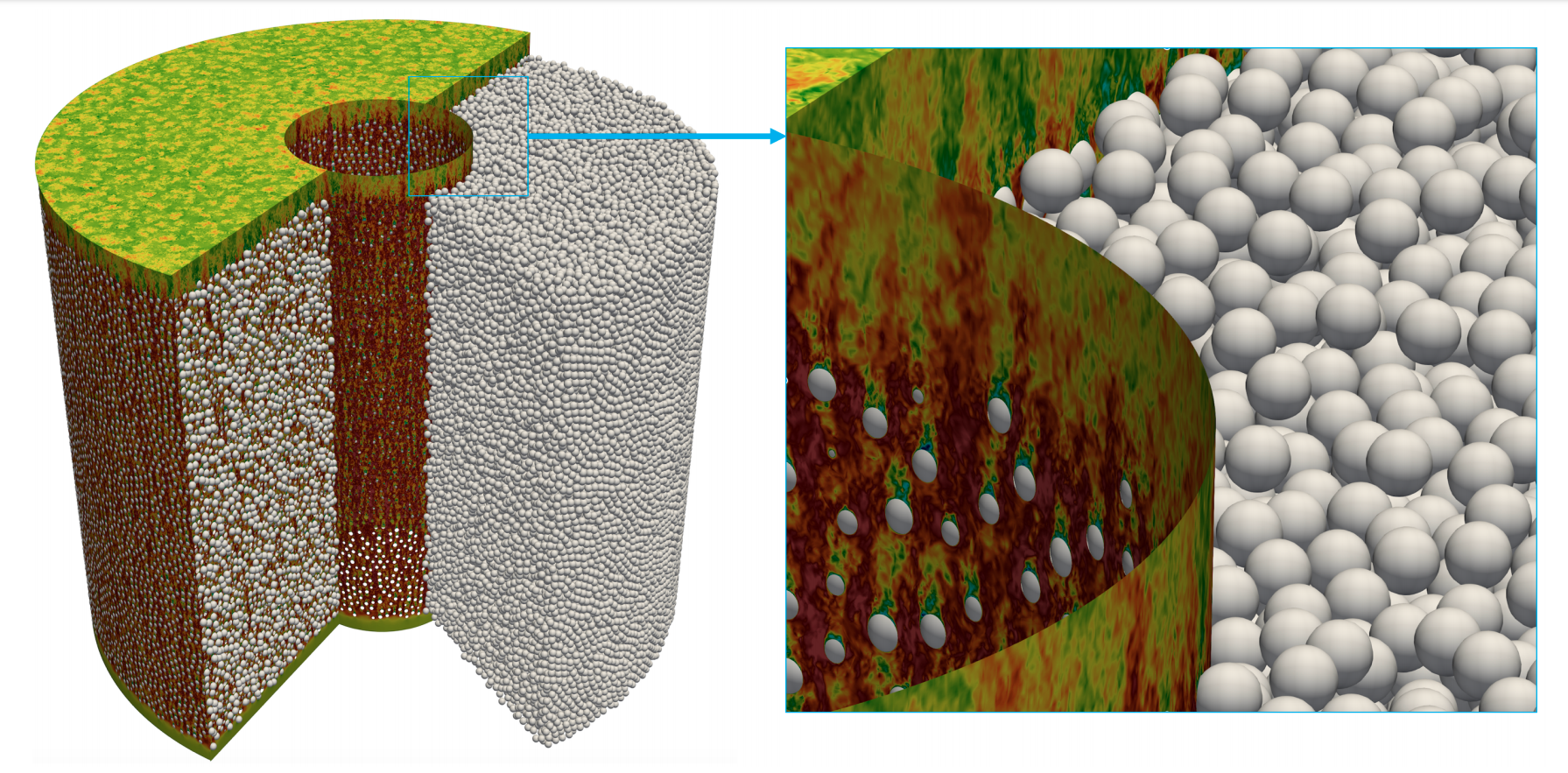
Full-core PBR simulations with NekRS Lan et al. (2021); MOOSE finite element heat conduction is coupled with NekRS and OpenMC for up to 127,000 pebbles Fischer et al. (2021). Figure shows fluid velocity predicted by NekRS.

Multiphysics model of a Helium Cooled Lead Lithium (HCLL) tritium breeder blanket module from the EU DEMO using OpenMC and MOOSE heat conduction Novak et al. (2023). Image shows the solid temperature in the cooling plates. The OpenMC model uses CAD geometry, capable of highly complex geometry.
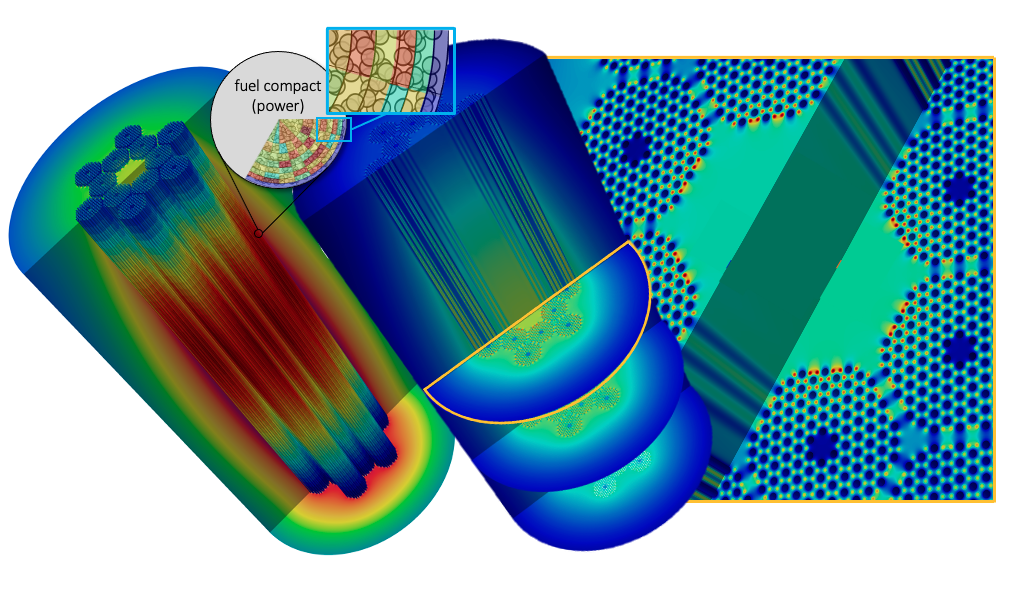
Full-core multiphysics model of a high temperature gas reactor using OpenMC-THM-MOOSE Novak et al. (2022); figure shows the OpenMC power and MOOSE solid temperature.
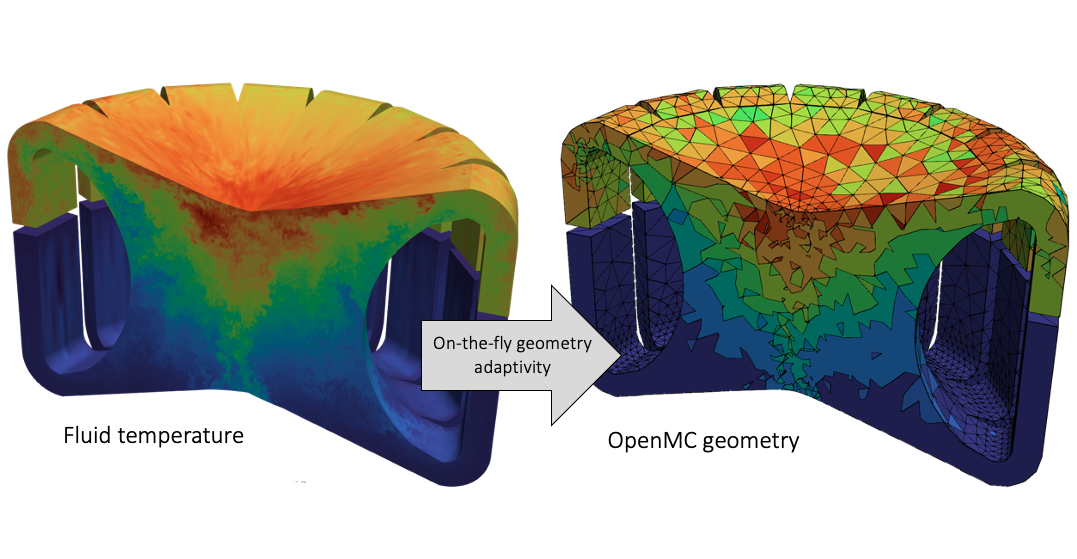
Multiphysics model of a Molten Salt Fast Reactor using NekRS-OpenMC Novak et al. (2023). OpenMC geometry uses CAD, with on-the-fly adaptive re-generation of the OpenMC cells according to contours in temperature and/or density feedback.

Multiphysics model of a Heat Pipe Microreactor using OpenMC-MOOSE-Sockeye Eltawila et al. (2024).
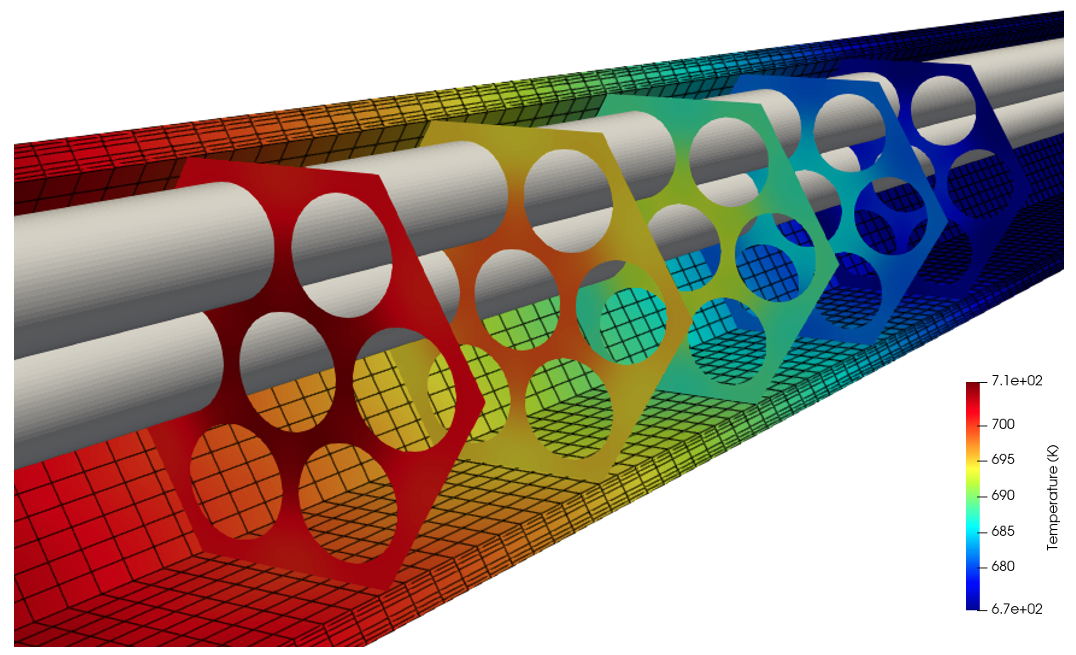
Multiphysics model of a 7-pin SFR fuel bundle using NekRS-OpenMC-MOOSE Novak et al. (2022); figure shows fluid temperature predicted by a momentum source NekRS model with solid duct temperature predicted by BISON.
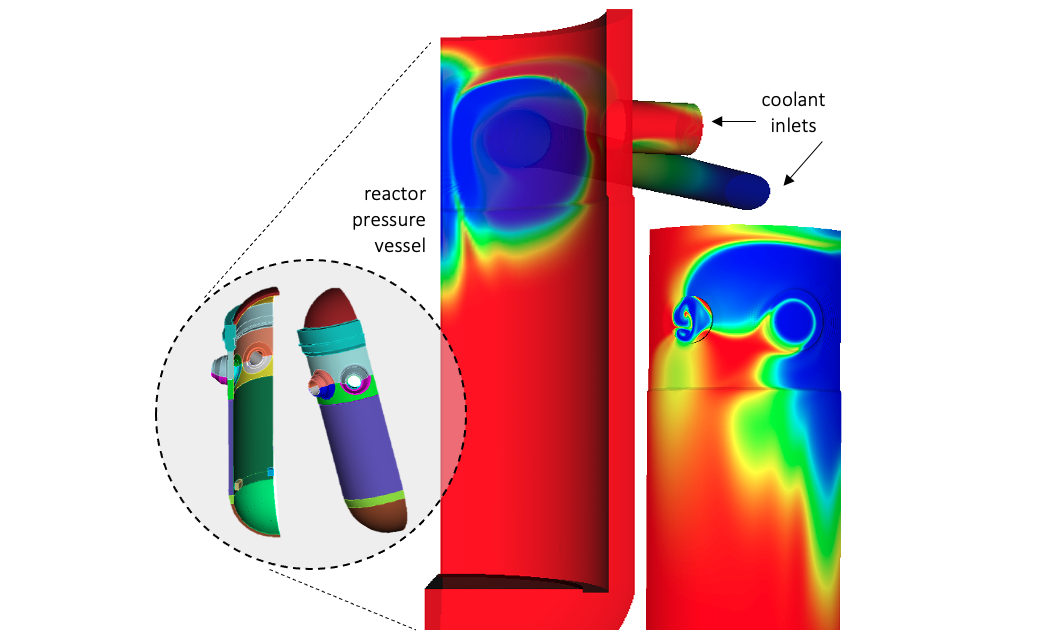
Coupled NekRS CFD simulations with the MOOSE solid mechanics module for predicting stress-strain response in LWR reactor vessels Yu et al. (2022). Figure shows the fluid velocity and temperature predicted by NekRS, which are then fed to a solid mechanics model.

Coupled NekRS CFD simulations with systems-level feedback from SAM, for predicting tracer concentration in a loop with a double T-junction Huxford et al. (2023).
Getting Started
Repository is available on GitHub - learn how to get started
Tutorials and Documentation
Explore the tutorials and source documentation to learn about code capabilities
Build on HPC Systems
Find instructions for building on common HPC systems across the National Laboratories
Website Version
This documentation page was last built on May 08, 2025.
References
- M. Eltawila, A. Novak, and Y. Miao.
Coupled Multiphysics Modeling of Heat Pipe Microreactors using Cardinal, BISON, and Sockeye.
In Proceedings of Physor. 2024.[BibTeX]
- P. Fischer, E. Merzari, M. Min, S. Kerkemeier, Y. Lan, M. Phillips, T. Rathnayake, A. Novak, D. Gaston, N. Chalmers, and T. Warburton.
Highly Optimized Full-Core Reactor Simulations on Summit.
October 2021.
arXiv:2110.01716.[BibTeX]
- A. Huxford, V.C. Leite, E. Merzari, L. Zou, V. Petrov, and A. Manera.
A Hybrid Domain Overlapping Method for Coupling System Thermal Hydraulics and CFD Codes.
Annals of Nuclear Energy, 189:109842, 2023.
doi:10.1016/j.anucene.2023.109842.[BibTeX]
- Y. Lan, P. Fischer, E. Merzari, and M. Min.
All-hex meshing strategies for densely packed spheres.
arXiv, 2021.
URL: https://arxiv.org/abs/2106.00196.[BibTeX]
- A.J. Novak, D. Andrs, P. Shriwise, J. Fang, H. Yuan, D. Shaver, E. Merzari, P.K. Romano, and R.C. Martineau.
Coupled Monte Carlo and Thermal-Fluid Modeling of High Temperature Gas Reactors Using Cardinal.
Annals of Nuclear Energy, 177:109310, 2022.
doi:10.1016/j.anucene.2022.109310.[BibTeX]
- A.J. Novak, H. Brooks, P. Shriwise, A. Hegazy, and A. Davis.
Multiphysics Coupling of OpenMC CAD-Based Transport to MOOSE using Cardinal and Aurora.
In Proceedings of M&C. 2023.[BibTeX]
- A.J. Novak, P. Shriwise, R. Rahaman, P.K. Romano, E. Merzari, and D. Gaston.
Coupled Monte Carlo Transport and Conjugate Heat Transfer for Wire-Wrapped Bundles Within the MOOSE Framework.
In Proceedings of NURETH. 2022.[BibTeX]
- Y. Yu, A. Novak, D. Shaver, and E. Merzari.
Coupled Simulation of Reactor Pressure Vessel (RPV) Subjected to Pressurized Thermal Shock (PTS) Using Cardinal.
In Proceedings of ATH. 2022.[BibTeX]